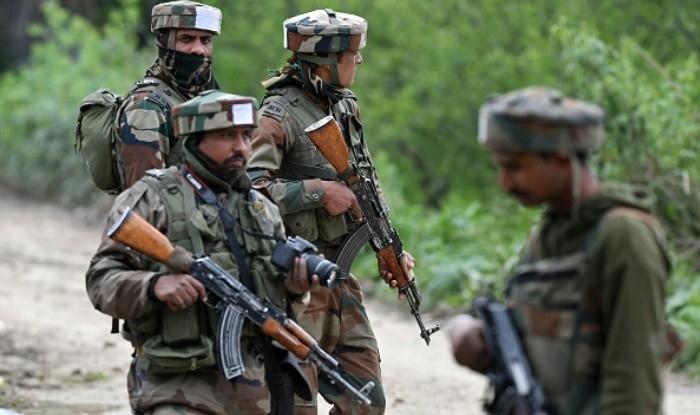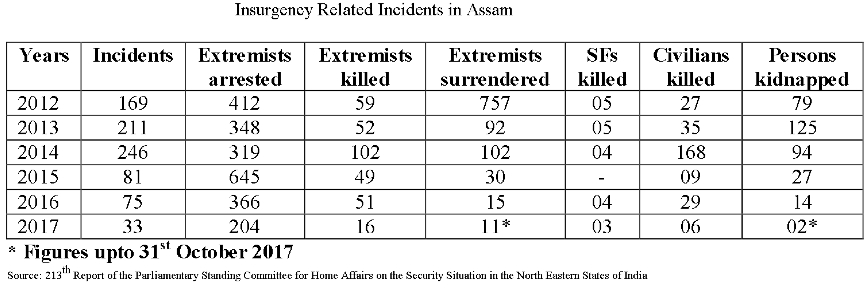AFSPA: Contradictions in Assam

The 213th Report of the Parliamentary Standing Committee for Home Affairs on the Security Situation in the North Eastern States of India has devoted a separate chapter to the operation of the Armed Forces (Special Powers) Act (AFSPA). TheCommittee submitted the Report before both the Lok Sabha and the Rajya Sabha on July 19 2018. The report highlighted the success story of AFSPA being revoked in Tripura. However, it also mentioned a strange phenomenon in Assam wherein, although the number of insurgency-related incidents had reduced, the area under which AFSPA was applicable had increased. The explanation for this situation could be manifold, but not limited to the position of the now weakened Assamese armed groups.
Read More: The State’s First Line of Defence
Referring to the situation in Assam, the report stated:
“The Committee is unable to comprehend the divergent perceptions of the situation in Assam. On the one hand, the Ministry has asserted that there has been an improvement in the security situation in Assam and, on the other hand, the area declared as disturbed under the Armed Forces (Special Powers) Act, has been increased. The Committee also notes that the State Government of Assam has notified the whole State as disturbed area on the plea that it is not the appropriate time to reduce the area under AFSPA. This is a paradoxical situation that needs to be resolved.”
However, what is interesting in the expansion of the area under AFSPA is that it was not done through a Union Government Notification, but rather at the behest of the state government. The report summed up this point:
“The Committee was also apprised that with regards to the areas to be declared as disturbed areas, in the State of Assam, there was some difference of opinion between the Government of India and the State Government. The Government of Assam through their notification declared the whole state of Assam as [a] disturbed area under the Armed Forces (Special Powers) Act because they have got concurrent power. The State Government of Assam had explained that it was slightly early to reduce the area under the AFSPA Notification.”
Read More: Sanction Without Investigation? Centre’s Move Poses Threat to Democracy
From the data the report contains, it appears that all the findings are from before 2018. The notification that the report referred to – whereby AFSPA was extended to the whole of Assam – was passed in 2017. The Committee had also recommended that AFSPA's implementation in Meghalaya could be revoked, which eventually happened in April 2018. In Assam, however, the operation of AFSPA was extended for another six months in March.
According to the report, the armed movements in Assam began during the anti-foreigner agitation. The All Assam Students Union (AASU) agitation began in 1979 – the same year that the United Liberation Front of Assam (ULFA) was born. In the course of the six-year-long agitation, ULFA gained in size, and power and was supported by a large section of the people of Assam in its struggle for a “sovereign socialist Assam”. The report mentioned that the support for ULFA was due to several factors. “These factors were influx of illegal migrants, unemployment, corruption in the government machinery, dominance of non-Assamese in the business sector, perception of exploitation of Assam's natural resources by the Centre, and alleged human rights violations by the security forces.” The report also added that, “However, due to a large scale criminalisation of its cadres and various other reasons, ULFA soon lost its credibility and public support.” After Arabinda Rajkhowa was 'arrested' and entered talks with the Union Government, ULFA split into ULFA(Progressive) led by Rajkhowa and ULFA(Independent) led by Paresh Baruah.
The report also noted that ULFA's armed movement was not the only one in Assam. The other armed movement of a similar proportion is the Bodo movement. This movement emerged two years after the Assam Accord was signed. Led by the All Bodo Students Union (ABSU), the agitation for a Bodoland state within India turned into an armed movement for a sovereign Bodoland with the formation of the Bodo Security Force. The Bodo Security Force subsequently renamed itself as the National Democratic Front of Bodoland (NDFB). In 1993, the Bodo Accord was signed between ABSU, the Government of India and the Government of Assam. The Accord established limited autonomy to the Bodo people through the Bodo Autonomous Council (BAC). However, due to structural difficulties that emerged later, the BAC collapsed and the Bodo Liberation Tigers (BLT) was formed in 1996.
In 2000, a ceasefire was signed between the BLT and the Government of India. In 2003, the Bodoland Territorial Council was formed. Two years later, the NDFB too signed a ceasefire with the Government of India. However, a faction led by Ranjan Daimary continued the armed movement till 2011 after Daimary was arrested. Then another group opposed to a truce emerged from the Daimary faction in 2012. Led by IK Songbijit, the NDFB(S) quickly earned infamy for its brutality when it carried out ethnic cleansing attacks. Songbijit was later ousted by a coup within, he was replaced by Saoraigwra.
Other smaller, more localised armed movements also emerged in Assam. Some were led by the Adivasis such as the Adivasi National Liberation Army (ANLA) – which was probably a reaction to their social position in the state since they came as labourers in the tea gardens, and have faced the brunt of the ethnic armed movements. The other groups consist of individual Kachari groups such as the Karbis, Dimasas and Rabhas, as well as spillovers from the Manipur, Mizoram and Nagaland-based armed movements.

However, the table included in the report makes it clear that despite the alphabet soup of the armed groups, the number of incidents have drastically reduced. This, of course, gives credibility to the concerns raised by the Parliamentary Standing Committee on the contradictions in Assam.
What is interesting is that the state government has mentioned that 'the situation is not right' for revoking AFSPA from Assam. On one hand, it could indicate apprehensions over the Paresh Baruah-led ULFA(I) and the NDFB(S)'s capacity to regroup and regain their strength in the state. This is also heightened by the fact that both groups are members of the United National Liberation Front of Western South East Asia (UNLFW). But on the other hand, the statements made by the Ministry of Home Affairs (MHA) – as recorded in the report – indicate that support for the groups has dwindled over the years. This is yet another contradiction.
However, the final draft of the National Register of Citizens is yet to be published. The Citizenship Bill, despite being shelved for the moment, is still an issue – not just in Assam but the entire Northeast region. Therefore, the state government may be concerned about any fallout from the two exercises. Thus, the government is worried about the socio-political implications of its own policy decisions. The existence of armed movements makes for a dangerous mix if the people reject such policy decisions. Irrespective of which end of the political spectrum they exist on.
Get the latest reports & analysis with people's perspective on Protests, movements & deep analytical videos, discussions of the current affairs in your Telegram app. Subscribe to NewsClick's Telegram channel & get Real-Time updates on stories, as they get published on our website.
























